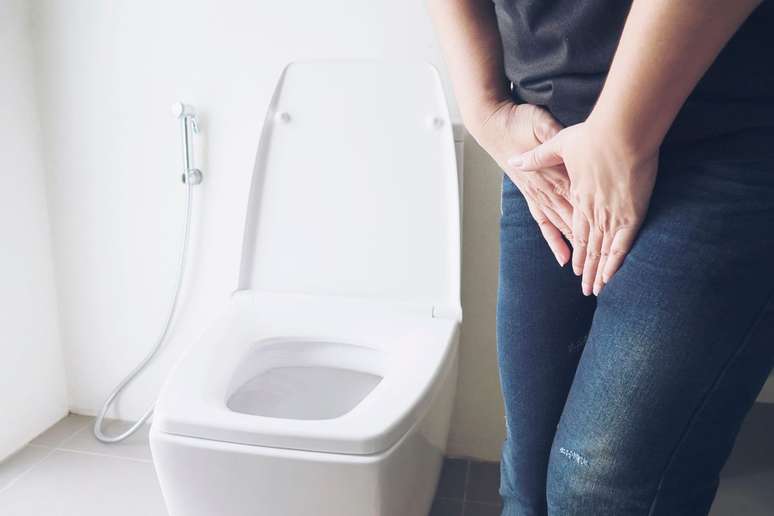Urinary tract infections are a very common problem among women. Discover tips to protect yourself from the disease!
A urinary infection It is a health problem that affects millions of people every year, being more common among women.
It occurs when germs (viruses, fungi or bacteria) invade the urinary system, including the urethra, bladder and, in severe cases, the kidneys. “The most common is bacterial,” says the Doctor Henrique Carrascossinephrologist.
According to him, the disease can be classified into two types: cystitis AND pyelonephritis.
- Cystitis
A cystitis It is a lower urinary tract infection that mainly affects the bladder. Your main symptoms are: burning and tingling during urination, pain in the lower abdomen, desire to pee continuously, sensation of not emptying the bladder and blood in the urine.
In most cases, treatment of cystitis is simple. However, if it is not done correctly, There is a risk that the condition will develop into pyelonephritis.
- Pyelonephritis
Considered more serious, the pyelonephritis attacks the upper urinary tract, reaching the kidneys. It can trigger nausea, lumbar back pain, High fever AND malaisein addition to the aforementioned symptoms of cystitis.
If not treated properly, the patient can experience complications such as loss of kidney function and generalized infection . “It is a more delicate situation that can even lead to death”, warns the doctor.
CAUSES
The causes of urinary tract infections are different. Among the main ones we remember the lack of proper hygiene after bowel movement and the intestinal malfunction.
Furthermore sexual activity it can also contribute to bacteria entering the urethra, especially in women.
Another factor that increases the chances of urinary infection is habit hold your pee. This is because the longer urine remains in the bladder, the more likely microorganisms are to reproduce.
“A presence of kidney stones can contribute to the disease, since stones are environments that favor the proliferation of bacteria and antibiotics have great difficulty penetrating them. Men with prostate problems AND women in menopause or during menstruation they also have a better chance of developing it,” adds Dr. Henrique.
The expert also underlines this not drinking the ideal amount of water every day it can make it difficult to eliminate bacteria and waste from the urinary tract.
DIAGNOSIS AND TREATMENT
“The diagnosis is clinical. The doctor evaluates the symptoms and, if necessary, may order further tests, such as urine AND urine culture. When pyelonephritis is suspected, the blood count and the ultrasound it can also be requested,” he points out.
Treatment should be determined based on the infection, but generally involves use of antibiotics.
In case of pyelonephritis, it may be necessary hospitalization and the intravenous drug administration.
The nephrologist highlights that, when the patient presents a recurrent urinary tract infection (more than two or three episodes in a six-month period), drugs are usually indicated to prevent and reduce the risk of new contamination. “Prophylactic treatment involves using a lower dose of antibiotic for longer periods.”
WHY DO URINARY INFECTIONS AFFECT WOMEN MORE?
Women are more likely to get urinary infections due to anatomical questionssays Carrascossi.
“A the female urethra is shorter than the male one, which means the bacteria have to travel a shorter distance to reach the bladder. Furthermore, it is located very close to the anuswhich also ends up facilitating the migration of microorganisms from the intestine to the urinary tract and causing infections.
TIPS TO PREVENT URINARY INFECTIONS
TAKE LOTS OF WATER
When you drink enough fluids, pee becomes less concentrated and the urination becomes more frequent“Filling and emptying the bladder several times works like a wash, which recycles the bacteria and makes it difficult for them to settle in the structures of the urinary system”, explains gynecologist Edilson Ogeda, of the Samaritan Hospital, in Sao Paulo.
GO TO THE BATHROOM AFTER SEX
Pee immediately after having sex It is essential attention to maintain the health of the urinary tract, as the flow of urine helps carry away microorganisms that can migrate from the vagina to the urethra and reach the bladder.
TAKE CARE OF YOUR INTESTINE
An imbalance in the intestinal flora, such as diarrhea OR Cold, can contribute to the proximity of the bacteria of the organ to the urethra. To avoid this, Dr. Henrique recommends adopting a diet rich in fiber and, of course, if hydrate well.
DO NOT HOLD YOUR PEE
To the hold pee in the bladder for a long timewe are giving bacteria and other infectious agents in the urinary tract the opportunity to proliferate.
MAINTAIN GOOD PERSONAL HYGIENE
During bathing, properly clean the genital and anal region. Also, when using toilet paper after a bowel movement, do it from front to back, to ensure that feces are not transferred to the intimate area. Especially for women, this precaution is even more necessary.
WEAR COTTON UNDERWEAR
Being a natural and breathable material, the cotton allows ventilation of the skin in the genital area, leaving it free of humidity.
And be careful, women: disposable sanitary pads they can contribute to urinary tract infections because they retain moisture and heat in the region. Therefore, during your menstrual cycle, remember to do this change them regularly and, if possible, prioritize other healthier options, such as menstrual cups.
LOOK FOR A DOCTOR
When you notice any symptoms, the best thing to do is look for a doctor. “The professional will evaluate your case, find an accurate diagnosis, prescribe the correct therapy and share with you all the guidelines regarding the prevention of urinary infections”, concludes Carrascossi.
Source: Terra
Ben Stock is a lifestyle journalist and author at Gossipify. He writes about topics such as health, wellness, travel, food and home decor. He provides practical advice and inspiration to improve well-being, keeps readers up to date with latest lifestyle news and trends, known for his engaging writing style, in-depth analysis and unique perspectives.








